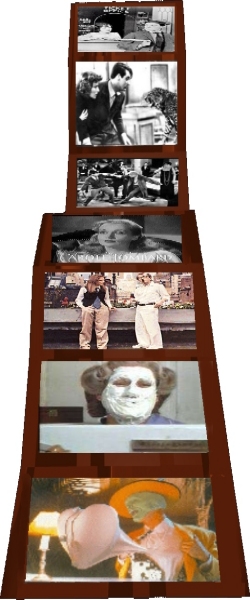
Screening:
MW, 12:30-2:50
Class:
TTh, 12:30-1:50
Room:
Thompson 101
Instructors
Claudia
Gorbman
Padelford
A-504
543-2288
Hours:
W, 10:30-12:30
Kimberlee
Gillis-Bridges
Padelford
A-16
543-4892
Hours:
TTh, 11:30-12:30
Last Updated:
4/27/00
Comments
or queries
|

Studying for the Midterm
The midterm is a short, generally objective
test of about 30-40 minutes, to be held Tuesday May 2 at the beginning
of class. If you have been present in lecture and at screenings, and if
you have regularly done the reading assignments attentively, this should
be a very straightforward test presenting no difficulty. The format: fill-in-the-blank,
short-answer, and several 1- to 2-sentence answers.
The first section will consist of film
identifications. On the basis of a clear allusion to a given film, youíll
be asked to supply the correct title and director of the film in question.
The films on the midterm will be as follows:
-
The Pawnshop
-
Sherlock Jr
-
The General,
-
Safety Last (OK to credit Harold Lloyd
with "directing")
-
The Dentist and The Barber Shop
(OK to credit WC Fields with "directing" these)
-
I'm No Angel (OK to credit Mae West with
"directing")
-
Duck Soup (OK to credit Marx Brothers
with "directing")
-
Bringing Up Baby
-
It Happened One Night
-
The Lady Eve
-
Sullivanís Travels
There will be two more sections, asking
you to fill in blanks or write 1- or 2-sentence answers.
Types of terms and names and dates to identify
(there may be others):
-
Date of Production Code, date (approx.) of the
coming of sound.
-
The sight gag, and at least two categories defined
by Noel Carroll
-
Screwball comedy; the identifying elements of
screwball
-
High comedy, low comedy
-
Slapstick
-
PCA, Will Hays, Joseph Breen
-
Pre-Code films
-
Modernity
Two-sentence answers to questions such
as:
-
How is laughter a "social gesture" in Bergsonís
view?
-
How does Bergson define the comic?
-
Any of the on-line study questions on Bergson
or Levowitz
Be sure to review:
-
David Robinsonís summarizing essay on silent
film comedy
-
Beltonís essay, up through screwball and Sturges
-
What is a sight gag, and how does it work
-
Production Code: be familiar with its rules in
various categories, and the rationale for its rules
-
Bergsonís theory of laughter as a "corrective"
for "inelasticity" or "mechanical" unawareness
-
Levowitzís developmental models for why we laugh:
the notion of mastery (and superiority), and the taboo or forbidden subjects
allowed release/expression in humor
-
Be prepared to apply the ideas from Production
Code, Bergson, or Levowitz to specific scenes in films screened in class
|
 |

